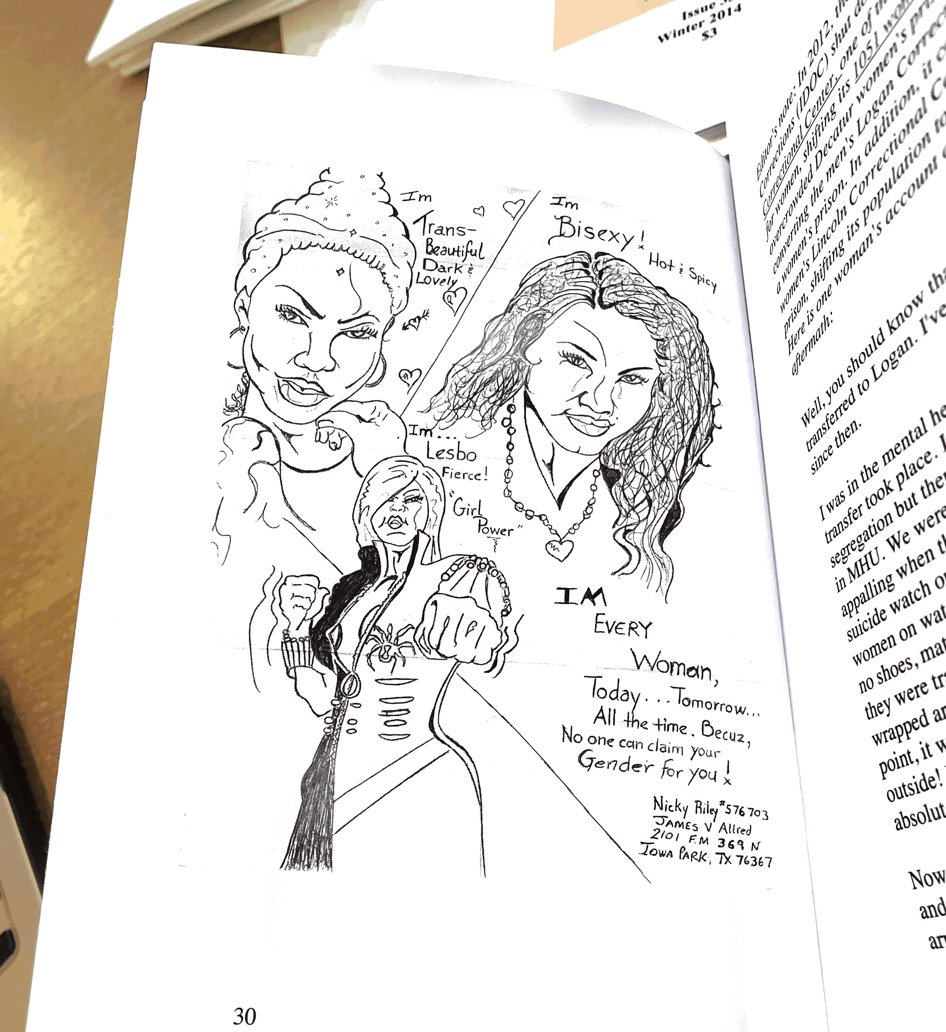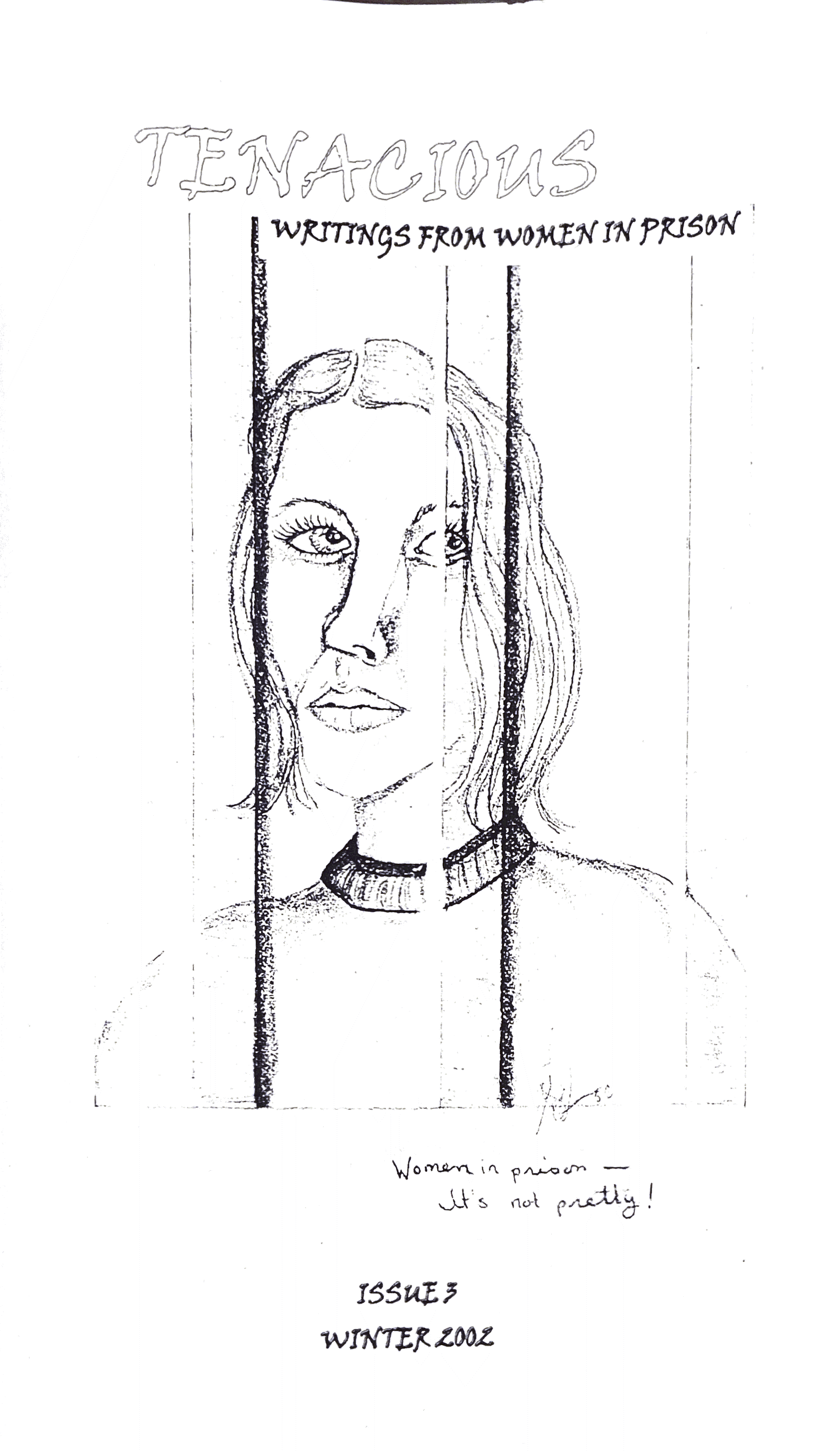Post Contributed by – Molly Carlin, Ph.D. candidate, School of Media, Arts and Humanities, University of Sussex, 2022 Marshall Meyer Human Rights Travel Grant Recipient
My research centers around the suppression of political voices in US prisons. Through archival research I am identifying the principal mechanisms employed by prison officials to prevent political organization and expression within institutions from 1964 onwards. Much of the earlier period looked at in my work has been focused on the Black Power movement, and the use of solitary confinement, tactical transfers and censorship to prevent key political activists in the movement from organizing within prisons. Many of these practices can be seen to continue throughout the period into the twenty-first century, and have been used, albeit less explicitly, to separate politically outspoken prisoners and establish obstacles to their activism.

The Rubenstein Human Rights Archive’s collection of incarceration zines elucidates varied prison experiences, and in particular the institutional responses to political writing. The recently acquired Tenacious Zine collection has provided an invaluable insight into the experiences and writing of incarcerated women and non-binary people. Commonalities in incarcerated experiences of ableism, discrimination against LGBTQIA+ people, and the difficulties of parenthood are evident across the country. These collections have been pivotal to my research on two counts: firstly, in exposing shared contemporary experiences of prisoners over the past twenty years, and secondly, in prioritizing the voices of marginalized identities within prison activism.
Primarily, what can be drawn from the hundreds of experiences recounted in the Tenacious Zine Collection, the Inside-Outside Alliance Records, and the Incarceration Zine Collection at the Rubenstein, is a resounding and unrelenting commitment to fight back against the systemic oppression seen in the carceral state. These sources come from prisons across the country, and from the 1960s right through to the 2020s, yet exhibit similarly oppressive experiences despite continued efforts to organize. Incarcerated activists have started writing campaigns, hunger strikes, work stoppages, and collaborated with ‘outside’ protesters to form a robust prisoners’ rights movement over the years. This chain of personal knowledge exchange moving within and stemming from prisons combines political theory and understanding of systemic oppression with communication of everyday lived experience.

Rachel Galindo wrote in Tenacious Zine in 2011: ‘Over these years of incarceration, I have realized the value in writing with the purpose of sharing with others my experiences in a women’s prison. I hope my stories stand as examples that can be applied to a broader consideration of the role of prisons—locally, nationally, and globally—and their collective effort.’ She continued ‘This is the importance of writing. It is neither static nor a one-sided activity. It lends a forceful hand of connection through reaching out and receiving. In reading others’ writing, I am provoked, informed and inspired. This dynamic exchange is a part of our ongoing exploration and forward movement as a people… When we write we are participants engaged in change and building something better together.’[i]
Galindo’s perception of writing as a valuable tool to engage activists outside and build community amongst prisoners with shared experiences reflects long-standing approaches to prison protest from decades prior. Another Tenacious Zine writer recalled realizing that ‘just because we are in prison doesn’t mean that we don’t have a voice,’ when formerly incarcerated poet and writer Jimmy Santiago Baca came to visit at Mabel Bassett Correctional Center.[ii] Baca’s influence here exhibits the vital impact of activist networks and writerly collaboration, and the importance of words as a tool for organization, community, and resistance within the constraints of the penal system.
Yet this political writing, and activists’ repeated demands for core rights and respect have been met consistently with resistance and suppression from prison authorities. Vocal dissenters have been repeatedly placed in extensive periods of solitary confinement, hunger strikers force fed, labour strikers inadequately fed, visitations stopped, activists transferred, letters withheld and reading censored. Patterns in prison responses focus on blocking political activism and knowledge exchange through physical barriers and manipulation. The zine collections at the Rubenstein have unveiled these barriers, with writers exposing the ‘immediate surveillance,’ interception and censorship of prison writing.
One account in Tenacious Zine exposed escalating responses from prison officials to their writing on prison abuse. Beginning with interception of mail containing a drawing for a manuscript on sexual assault in prison, Barrilee Bannister recounted continued efforts by prison staff to prevent their writing from leaving the prison. Officers filed misconduct reports, searched Bannister’s bunk to find the manuscript, faked allegations of violent threats, removed privileges and transferred Bannister to an increased security wing.[iii] Bannister’s experience marks just one in a sustained effort to inhibit political expression and freedom in writing from prison, with many other instances recounted in the Rubenstein’s collections and beyond. On 26th September 2022, thousands of Alabama prisoners began a labor strike to protest understaffing, violence, sexual assault and unpaid labor within the carceral system.[iv] Prison authorities responded with withheld meals and visitation stoppages, and prisoners were forced to mobilize outside communities to help fundraise for commissary supplies to ensure protesters were fed.
Prisons continue to remove all but the most basic of rights and necessities from those within, and so the need for adequate avenues for political expression remains pivotal. Yet what has been seen in varied forms throughout this period is a system which functions to prevent this and which ignores or prohibits prisoners’ voices from being heard. The rise of mass incarceration coupled with the growth of supermax prisons has vastly increased the scale of this issue, to the point where this can now be seen as widespread political suppression. As prisoners across the country continue to take action against these injustices, it is important to identify the mechanisms that have long been employed to silence incarcerated political voices and how these have shifted.
*Molly Carlin’s grant project for the 2022 Marshall Meyer Human Rights Travel Grant is entitled, “How to Jail a Revolution: Theorising the Penal Suppression of American Political Voices, 1964-2022.”
[i] Tenacious Zine, Issue 23, Summer 2011
[ii] Tenacious Zine, Issue 23, Summer 2011
[iii] Tenacious Zine, Issue 11, Spring 2007
[iv] Blakinger, K., ‘Alabama Said Prison Strike Was ‘Under Control.’ Footage Shows System in Deadly Disarray’, The Marshall Project, October 2022


